This post used to have 10 great novels. You never know when you adapt a novel if the movie will be better than the book. Some following novels were thought to become great movies. The projects were delayed indefinitely. Others were never really considered. Some of them are pure fiction, some are fantasies or science fiction. Worse novels found their ways to the big screen and a few of them even became box office hits.
First of the Great Novels: Shantaram by Gregory David Roberts
Of all the books on this list, “Shantaram” was the closest to be dramatized. It was published in 200. At Johnny Depp’s initiative, Warner Bros bought the rights to the book for $2 million. Depp was keen to star as “Lin”, Robert’s persona, a convict who escaped from an Australian prison after he was sentenced to 19 years, for multiple armed robberies. He went first to New Zealand and then to Bombay, where he stayed for ten years. Shantaram is his new nickname, given to him by one of the book’s characters. Despite some buzz created around the actual facts described in the book, Roberts said every now and then that Shantaram is a novel, not an autobiography.
The main character was to be played by Johnny Depp. The project never reached the goal. Peter Weir was scheduled to direct the movie after a screenplay adapted by Eric Roth, who already won the Oscar for the best adaptation with “Forrest Gump”. Roth adapted the screenplay from a draft written by Roberts. In 2009, the project was canceled. Rumors say that Mira Nair will replace Peter Weir, and Joel Edgerton will play Lin, but not earlier than 2019.
The Many-Colored Land by Julian May
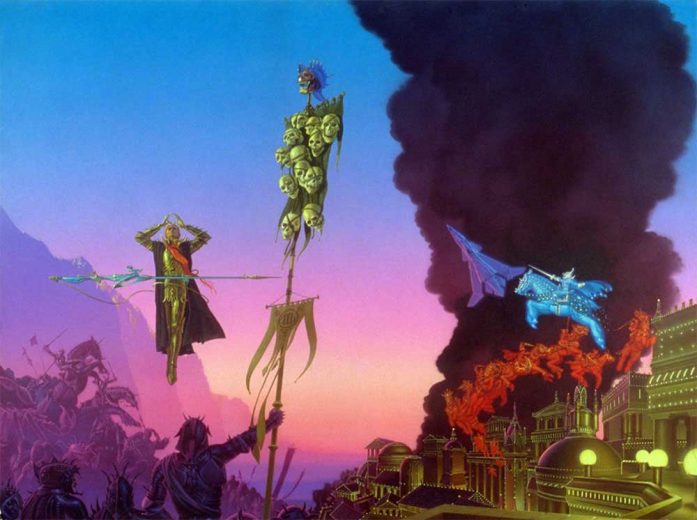
The Many-Colored Land by Julian May
[source: http://www.michaelwhelan.com/galleries/many-colored-land/]
This is the first book in a pack of four, the one that leaves the reader craving for more. It’s the beginning of a science fiction fantasy saga making much more sense than the acclaimed Star Wars series, and it was published in 1981. It’s called “The Saga of the Pliocene Exile”. It was written by Julian May, an American lady born in 1931, in Chicago, Illinois. Frank Herbert’s “Dune” was already adapted by David Lynch in 1984. Movies more or less inspired by Isaac Asimov’s books were and still are produced with the same lack of sense or even altering the complex subject to something much too superficial. In the 22nd century, man discovered time travel, only it was one way, and it was back five million years, to Pliocene Era. The earth misfits chose to leave their world as they know it and start a new life in the Pliocene. What they didn’t know was the surprise that awaited them there. At the gate, situated in France, the “exiles” were organized in groups of eight, in which they were delivered to their ancient destination.
A Suitable Boy by Vikram Seth
It seems that A Suitable Boy is one of the longest novels published in the English language in a single volume. It took Vikram Seth ten years to complete. It is a page-turner and a beautiful story through India’s first elections after the Independence at the same time. Set mostly in an imaginary city on the Ganges, it describes the life happenings of four families, centering on a young college student girl whose mother searches for a suitor. Politics, satire, Hindu-Muslim conflicts, the Zamindari System’s abolition, the caste system rules, high society life, everything surrounds Rupa Mehra’s search of the suitable boy. The girl, Lata, already has a loving flame at the university she attends, but rules are rules, so she has to respect them or try to convince her mother that she’s in love with a Muslim boy.
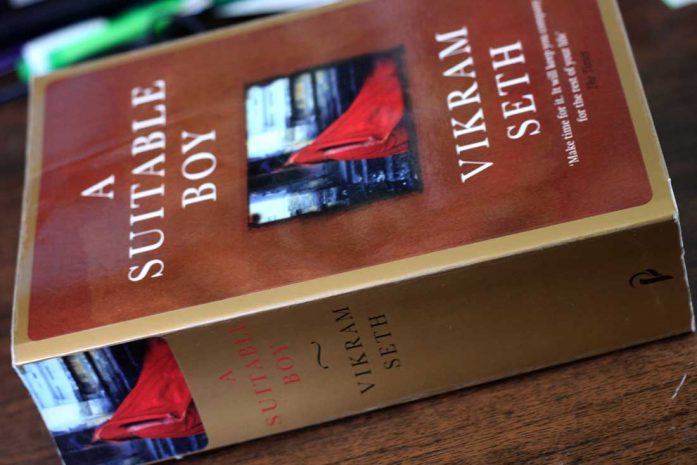
A Suitable Boy by Vikram Seth
[source: https://bookscomefirst.com/tag/indian-literature/]
A shame the movie was not made yet. Following the extraordinary success of this novel, Penguin offered Vikram Seth a £1.1Mil advance for the sequel, “A Suitable Girl”, but he failed to deliver it on time.
American Gods by Neil Gaiman
Neil Gaiman is loved by his readers more for his writings than for his wife’s exhibitionism. “American Gods” is a science fiction fantasy book awarded Hugo, Nebula, Bram Stoker, SFX magazine, and Locus Awards altogether.
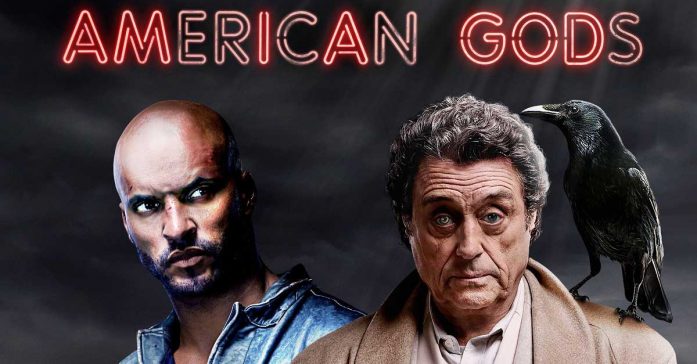
American Gods by Neil Gaiman
[source: dreadcentral.com]
Shadow is out from prison. Three days before his release, his wife, Laura, died in a car accident together with his best friend. He is approached by a mysterious character called himself “Mr. Wednesday” and offered a job as his personal bodyguard. They travel together and visit a bunch of Wednesday’s former associates and acquaintances. Of course, some extraordinary outcome needs preparing, thus the visiting around. Shadow finds out that Wednesday and his fellows are in fact ancient gods’ reincarnations: Odin, Thoth, Anubis, etc. Gods live as long as someone still believes in them. The climax, the outcome is a terrible fight between these old gods and the new American Gods of modern life: internet, media, and modern technology.
There is already a TV show scheduled in 2017. Since a movie hasn’t been made yet, I kept this book on my list.
Foucault’s Pendulum by Umberto Eco
This is an esoteric novel written by Umberto Eco, the Italian professor philosopher, and semiologist, and published in 1988. As a novelist, he was already famous for his debut “The Name of the Rose”, published in 1980, and dramatized in a confusing movie by Jean-Jacques Annaud, which also paved the walk to fame for Christian Slater.

Foucault’s Pendullum by Umberto Eco
[source: https://commons.wikimedia.org/wiki/File:Foucault_pendulum_closeup.jpg]
“Foucault’s Pendulum” is no less complex, and is more than cinematic. A witty dialogue, a sparkly plot and an intellectual approach can make this book a hit of a movie. A little European art combined with a little Hollywood magic can keep the viewers hunted for at least one hour and a half. With the subject treated less superficially than how it was treated in The Name of the Rose, avoiding confusion and clearly presenting the facts, such a movie can become a masterpiece, like the novel. “Foucault’s Pendulum” is a book about an invented conspiracy starting to being taken seriously.
A Fine Balance by Rohinton Mistry
Rohinton Mistry was already put on screen with his masterpiece “Such a Long Journey”. The screenplay was written by Sooni Taraporevala, who wrote three movies for Mira Nair already: “The Namesake”, “Salaam Bombay!” and “Mississippi Masala”.
“A Fine Balance” is a wonderful and sad novel set around 1975 in full State of Emergency. Prime Minister Indira Gandhi, in an attempt to sweep the opposition and keep the power, claiming an “internal disturbance”, had declared on her own, a state of emergency which conferred her almost unlimited power. Trying and succeeding to avoid some more heavy corruption charges, she bent the law in her favor, canceling free elections, imposing forced labor on the unprivileged people, and more. The book reflects those times through a few characters perspectives. A pair of tailors came to find work in a city which must be Bombay but is unnamed. Dina, a widow, employs them to work some orders she previously commissioned to a company. She also rented a room to Manekh, a young college student to supply her wages in her attempt to keep her independence.
One Hundred Years of Solitude by Gabriel Garcia Marquez
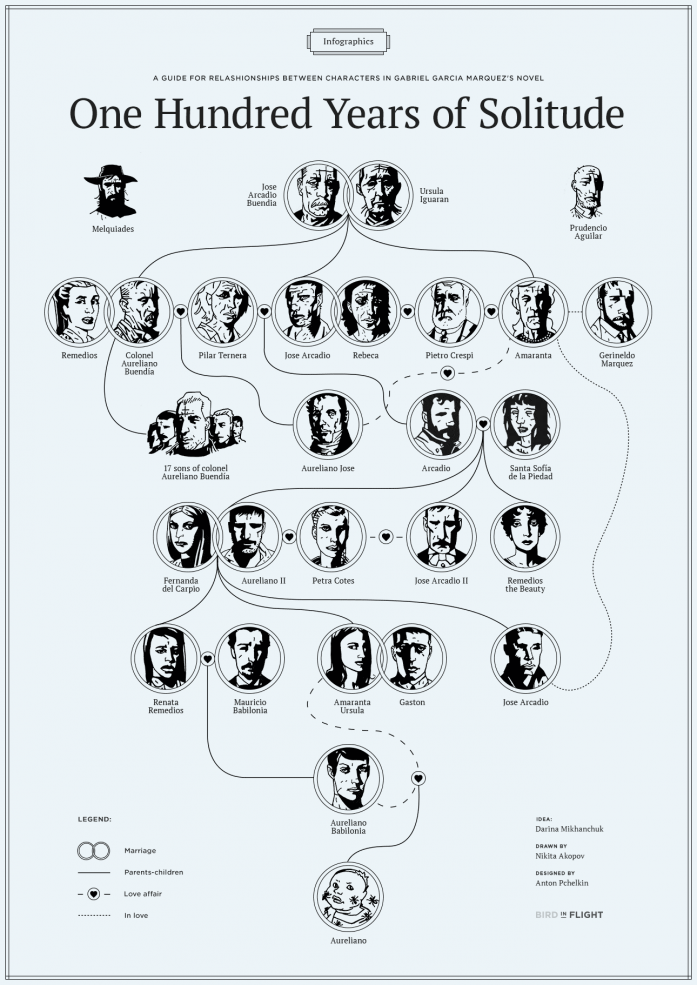
One Hundred Years of Solitude by Gabriel Garcia Marquez
[source: https://birdinflight.com/infographics/relationships-in-one-hundred-years-of-solitude.html]
This is a chronicle of an imaginary city through a family history, the Buendia. The family’s patriarch founded the city of Macondo and in that moment history begun to be written. It was the history of Colombia (the country Marquez was born in) and other countries in the Latin America that shared the same patterns. “One Hundred Years of Solitude” won the Nobel Prize for Literature to crown the career of one of the most respected writers in the world. A lot of junk found its way to the cinemas, but it seems harder for a quality writing. It is so rich in story, that one can choose any cinematic approach. The novel was published in 1967 and sold over 30 million copies since then. The problem was that Marquez declined every time to sell the filming rights. Only one Gabriel Garcia Marquez novel has been dramatized in 2007, “Love in the Time of Cholera”.
Raptor by Gary Jennings
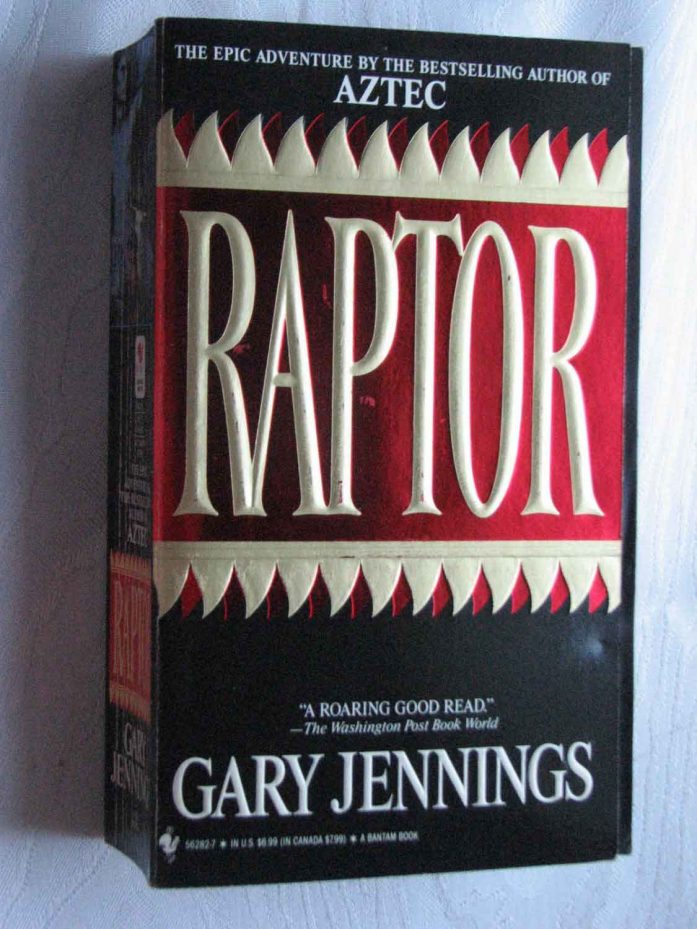
Raptor by Gary Jennings
[source: https://www.booklooker.de]
Considered “adult historical fiction”, “Raptor” is a novel written by Gary Jennings, the very talented self-educated author of „Aztec”. This novel is magnificent. Thorn, a hermaphrodite, participates in the Gothic conquest of the Roman Empire. The historical accuracy is researched in detail in every place mentioned, and the book is rich in local stories and colorful characters. Thorn doesn’t know who he is except that he is a Goth, presumably an Ostrogoth, and he made a quest from searching for his roots, and more than that, his fellow Ostrogoths’ roots. We even find Huns here, last hoards haunting the mountain forests in the Alps. He remembers himself always living at a monastery where he was abused by a monk. He was sent to a nuns monastery where he seduces a novice. Not long after that, he meets Wyrd, a former Roman legionnaire who teaches him everything he knows. Full of surprises and libido, this marvelous epic could make a fantastic movie.
A Canticle for Leibowitz by Walter M. Miller
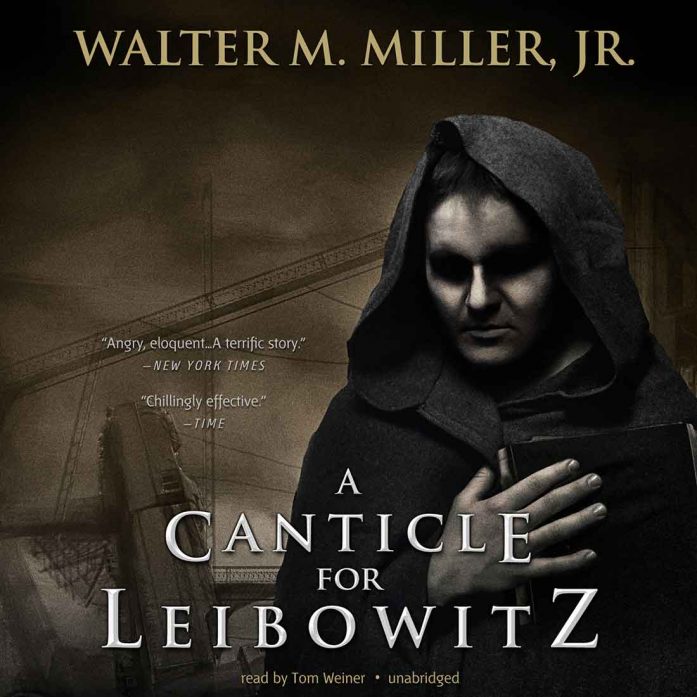
A Canticle for Leibowitz by Walter M. Miller, Jr.
[source: https://audiobookstore.com/audiobooks/a-canticle-for-leibowitz.aspx]
“A Canticle for Leibowitz” is a novel written by the American Walter M. Miller and it was first published in 1960. It is considered a masterpiece by critics because it encompasses a coherent story with intertwined themes of cyclic history, religion, church and state in general. You have to believe that it is less maddening than any of the “Mad Max” films, even if they apparently share a common landscape (scenery). It is based on three stories: “Fiat Homo” (Let There Be Man), “Fiat Lux” (Let There Be Light), and “Fiat Voluntas Tua” (Let Thy Will Be Done). Actually, it is the ultimate post-apocalyptic story that can be invented. All this is because of FAITH in whatever God or creed still remained after the “Apocalypse”. God, Saints (Saint Leibowitz), Pope, etc, are all in place as they are now, in a way or another, maybe not with the same logic of their status. The book won the Hugo Award in 1961. Every chapter of this book can be put on screen separately, as a different movie on its own.
Great Novels Are Many
This is an article I have written two years ago for a website specialized in bullet posts. It wasn’t published because they considered the subject uninteresting. Who reads books anymore? Initially they were ten great books in my list, but in the meantime one of them was poorly adapted into a mainstream movie starring the feminist champion Emma Watson. You can imagine that it was a fiasco. The tenth novel was David Eggers’ “The Circle”. Only Tom Hanks was brilliant there, but it’s not enough when the rest of the cast was filled with anti-talents like Watson or Ellar Coltrane.
If you liked what you read (and for that I humbly thank you for your patience), subscribe to this blog by Email! Follow this blog on Twitter, and on Facebook! For a joyous day, check out my pins on Pinterest or my grams on Instagram 😄. I hope you like this blog so much that you think it’s time to take a step further by becoming yourself a blogger; in order to do that have the kindness to read the Own Your Website offer I have prepared for you! You won’t regret. Thanks for passing by 😄 Speak your mind, don’t be shy!
